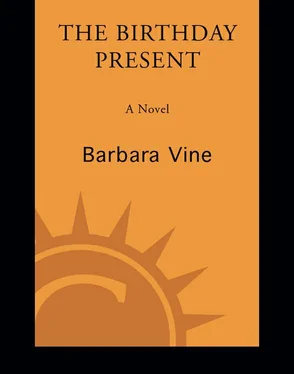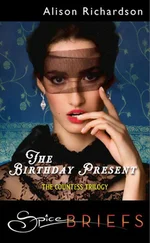Barbara Vine - The Birthday Present
Здесь есть возможность читать онлайн «Barbara Vine - The Birthday Present» весь текст электронной книги совершенно бесплатно (целиком полную версию без сокращений). В некоторых случаях можно слушать аудио, скачать через торрент в формате fb2 и присутствует краткое содержание. Год выпуска: 2008, ISBN: 2008, Издательство: Crown Publishing Group, Жанр: Триллер, на английском языке. Описание произведения, (предисловие) а так же отзывы посетителей доступны на портале библиотеки ЛибКат.
- Название:The Birthday Present
- Автор:
- Издательство:Crown Publishing Group
- Жанр:
- Год:2008
- ISBN:978-0-307-45199-6
- Рейтинг книги:5 / 5. Голосов: 1
-
Избранное:Добавить в избранное
- Отзывы:
-
Ваша оценка:
- 100
- 1
- 2
- 3
- 4
- 5
The Birthday Present: краткое содержание, описание и аннотация
Предлагаем к чтению аннотацию, описание, краткое содержание или предисловие (зависит от того, что написал сам автор книги «The Birthday Present»). Если вы не нашли необходимую информацию о книге — напишите в комментариях, мы постараемся отыскать её.
The Birthday Present
The Birthday Present — читать онлайн бесплатно полную книгу (весь текст) целиком
Ниже представлен текст книги, разбитый по страницам. Система сохранения места последней прочитанной страницы, позволяет с удобством читать онлайн бесплатно книгу «The Birthday Present», без необходимости каждый раз заново искать на чём Вы остановились. Поставьте закладку, и сможете в любой момент перейти на страницу, на которой закончили чтение.
Интервал:
Закладка:
“How is Ivor taking it?”
“All right. Not bad. He's tough, you know, Rob. He keeps saying, ‘There's no mention of me. They haven't made the connection and with luck they won't.' He's got a statement to deliver to the House this afternoon and he'll do it. He won't only do it, he'll do it as if he hadn't got a care in the world.”
But I think he was already making preparations for the action he meant to take. If things got worse, that is, if the connection was made between himself and what three newspapers had called “the kidnap car” and therefore between him and Sean Lynch. I don't mean he was resigned to his name coming into this; not at all, that mustn't be thought of. He hoped with all his strength that the media would stop there. What would happen when Sean came up for trial was a long way off; all sorts of things could happen between now and then. He had to think of the immediate future, the next few days in fact. He told us all this when the four of us met in the evening of the day after he came back from Culdrose.
He was an optimist, he always was, but a fatalist too, and I could hear it in his voice and, if it doesn't sound too melodramatic, see it in his eyes. It was a kind of foretaste of despair. Things which he had thought—had hoped—had passed away, buried themselves, had only been waiting before they were resurrected. Iris, who is the literary one of us, said it reminded her of a line from Lear: “The gods are just and of our pleasant vices make instruments to plague us.” Well, Ivor had had his pleasant vices all right, but he really thought by now that he had got away from the wrath of the gods.
“If nothing more has happened by the end of the weekend,” he said across the dinner table, “I've probably got away with it again. It's a funny thing,” he went on, “but when I read that bit in the paper on the flight home last night I had that ghastly feeling of some thing falling out of me. As one does. Like being in a lift when it comes to a stop too fast. And then this morning I read it again and I was used to it. I could take it. It didn't seem so bad. And tonight's Standard— well, there it is again, with a quote from that guy Mason and a photograph of the car after it crashed, and all I thought was, what was I making such a fuss about on the plane last night? You get used to things. I suppose you can get used to anything.”
“Oh, darling.” Juliet took his hand in both of hers. “Nothing more will happen. You won't have to get used to it. I'm sure it's over.”
He wasn't sure and I doubt if she was either. When we say we're sure, we mean we doubt but we're hopeful. A look of grimness, of dark resolution, had come into his face and, with hindsight of course, I think, as I've said before, that he was making up his mind then what he would do. We said good night early. They went back to Westminster and we to our Barnet-Hertfordshire borders, where all three children had, for reasons best known to themselves, been giving my mother a hard time.
I don't know what Ivor and Juliet talked about that night, though it's hard to imagine it could have been anything very different from what we'd discussed over dinner. Iris and I lay awake a long time, trying to guess what the media's next move would be. Both of us thought that, having talked to Damian Mason, they would be naturally led to Gerry Furnal; much hung on what Furnal might disclose to them. Would he say anything? He never had, but that was before the pearls and his discovery that the wife he revered had had a lover. It really depended on whether Furnal wanted to expose himself as a cuckold (to use Ivor's word) and whether in fact he'd be audacious enough to make accusations against a Minister of the Crown. Iris was positive he would. I was more doubtful. He of all the people involved in this business must know the most.
“If he'll stand up to my brother in a crowded room at a party and practically chuck his present in his face,” Iris said, “he'll have nerve enough for anything. He may want revenge. He may want more satisfaction than he got from giving back the pearls. And what's a Minister of the Crown these days? It's not the eighteenth century.”
Neither of us foresaw the direction from which discovery would come and I'm sure Ivor and Juliet didn't. Philomena Lynch perhaps or Gerry Furnal's wife, some witness to the pearls incident, or Jane Atherton's mother—we thought of all those. The pathway which led one astute investigative journalist to Ivor never crossed our imaginations. We didn't know all the people; we didn't know the host of minor characters on the perimeter. It couldn't have crossed Ivor's mind either as he lay sleepless at Juliet's side through the long watches of the night.
28
Nothing happened for a while, not for several days. The first story about Dermot Lynch had appeared on the Thursday morning, the day Ivor went to Culdrose, and we had all dined together on the Friday evening. Saturday's papers were empty of all references to Jane Atherton's murder or to Sean Lynch, and so were Sunday's—those Sunday papers, the cradles of scandal. For Ivor, waiting and dreading and hoping, it must have been rather like the days after the crash, when he waited and hoped Dermot would never regain consciousness. Worse now, though. Accumulations had happened since then. He had advanced up the ladder, he had inherited money, bought a glamorous house, acquired a beautiful fianceé, made numerous successful speeches, even come to the edge of (I repeat again my wife's quotation) “the fierce light that beats upon the high shore of the world.” It would be immeasurably worse for him now. But nothing happened. Not yet.
• • •
THE JOURNALIST WHO brought things to light was a man called David Menhellion. Iris says it's a Cornish name. In the first piece he wrote, he remarked on the fact that Juliet Case, thirty-five, fianceé of Ivor Tesham, MP for Morning-ford and a Minister of State at the Department of Defence, had once been the “live-in girlfriend” of actor Lloyd Freeman, killed in an accident to the “vehicle in which he was ‘allegedly' attempting to abduct Kelly Mason and demand a ransom from her husband, multimillionaire Damian Mason.” You can't libel the dead, of course, so Menhellion was in the clear there. Dermot was mentioned only as the driver of the kidnap car. But all this was known already. When she first became engaged to him, Juliet had herself said in an interview that she had once been married to Aaron Hunter and later had a relationship with Lloyd Freeman. She and Ivor had met through a mutual friend, the actress Nicola Ross. Very little comment had ever been made on this disclosure, but Menhellion made as much of it as he could. Had Mr. Tesham perhaps known Lloyd Freeman himself? If he had, hadn't he some questions to answer? It would be unusual, to say the least, ought to be impossible, for a member of the government to have a friendship with a kidnapper and one who was very likely also the author of demands for money with menaces made to Mr. Mason.
When I'd read this through twice I thought that on the whole it was pretty thin. It was scandal-sheet stuff. A rational reader would soon see that Ivor might well have known Lloyd Freeman as an actor only and have first encountered him in Juliet's company. Nor did it much worry Ivor.
“All that's already in the public domain,” was the way he put it, in the politician-speak he used when he was disturbed.
Next day, though, none of us could remain unconcerned. Menhellion's story, a lead in a tabloid, looked at first like a simple follow-up of the previous day's delving into Juliet's past. There was nothing new in the first three paragraphs. Then he asked his first rhetorical question: what was Ivor Tesham, Minister of State at the Defence Department, doing while his present-day fianceé was sharing her Queen's Park “apartment” with her live-in lover Lloyd Freeman? Involved, Menhellion said, in a “steamy” love affair with none other than Hebe Furnal, twenty-seven. Hebe had died in the kidnap car crash along with Lloyd Freeman.
Читать дальшеИнтервал:
Закладка:
Похожие книги на «The Birthday Present»
Представляем Вашему вниманию похожие книги на «The Birthday Present» списком для выбора. Мы отобрали схожую по названию и смыслу литературу в надежде предоставить читателям больше вариантов отыскать новые, интересные, ещё непрочитанные произведения.
Обсуждение, отзывы о книге «The Birthday Present» и просто собственные мнения читателей. Оставьте ваши комментарии, напишите, что Вы думаете о произведении, его смысле или главных героях. Укажите что конкретно понравилось, а что нет, и почему Вы так считаете.











